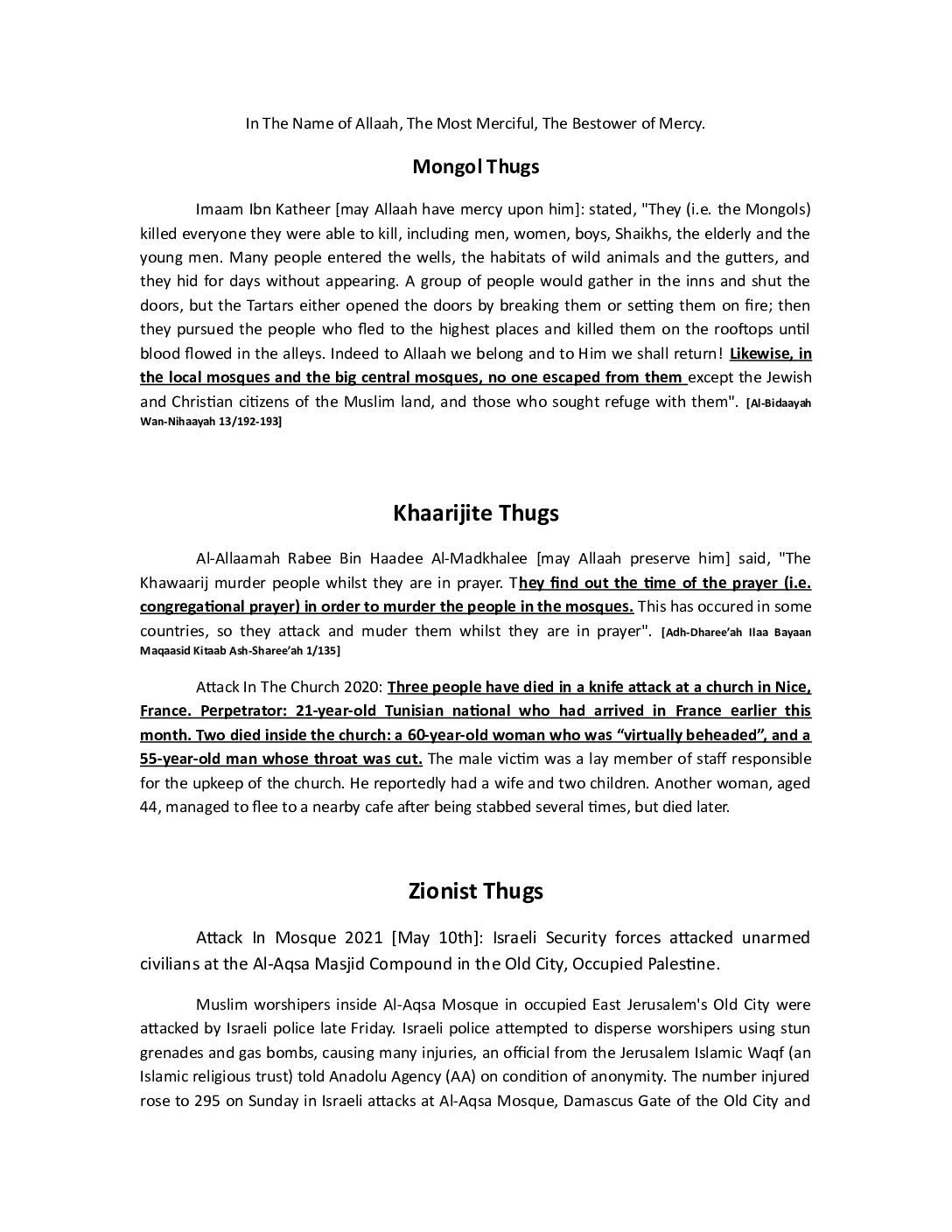Tag: Knowledge
A Book We Should Have if Possible -[Qaa’idah Jaleelah Fee At-Tawassul Wal-Waseelah’ by Shaikhul Islaam Ibn Taymiyyah]
Written by Salafi Dawah Manchester on . Posted in Aqeedah (Creed & Belief), Articles, Scholars of Islam, Seeking Knowledge, Worship - 'Ibaadah'.
Eemaan is in Need of Renewal because it does Wear Out (or decrease)!
Written by Salafi Dawah Manchester on . Posted in Aqeedah (Creed & Belief), Purification of The Soul, Worship - 'Ibaadah'.
The Messenger (sallal-laahu-alayhi-wasallam) said:
إِنَّ الْإِيمَانَ لَيَخْلَقُ فِي جَوْفِ أَحَدِكُمْ كَمَا يَخْلَقُ الثَّوْبُ فَاسْأَلُوا اللَّهَ أَنْ يُجَدِّدَ الْإِيمَانَ فِي قُلُوبِكُمْ
‘’Indeed, Eemaan wears out in the heart of one of you just as the thawb (i.e. clothes) wears out, so ask Allaah to renew Eemaan in your hearts.’’ [Source: Silsilah As-Saheehah –[Hadeeth No 1585 (Vol 4 page 113)]
The Creed of Ahlus Sunnah Wal Jamaa’ah –[Imaan Increases and Decreases]
See article on this link:
http://www.salafipublications.com/sps/sp.cfm?subsecID=GSC05&articleID=GSC050001&articlePages=1
Arabic: A Treatise on the Subject Matter of the Times of the Prayer –By Shaikh Muhammad Baazmool
Written by Salafi Dawah Manchester on . Posted in Islamic Jurisprudence - 'Fiqh', Salaah - Prayer, Scholars of Islam, Seeking Knowledge, Worship - 'Ibaadah'.
Shaikh Muhammad Baazmool (may Allaah preserve him) gives a brief explanation on ahaadeeth found in Muwatta Imaam Maalik on the subject matter of the times of the prayer and other affairs related to them. So get a copy and benefit from it if you have the ability alongside your regular attendance at the Duroos in the Salafi Masaajid and Centres. The Imaams and Mu’addhins in particular will find a lot of fawaa’id in this Treatise – either as a reminder or something new to learn InShaaAllaah. May Allaah grant us fiqh in the Religion Aameen.
Publisher: Daarul Istiqaamah
1st ed 1429AH (Year 2008)
Prayer Schedules – Important Rulings, Guideline, and Cautions
Written by Salafi Dawah Manchester on . Posted in Islamic Jurisprudence - 'Fiqh', Salafi Masjid Birmingham, Salafi Mosques & Centres.
Article source: www.salafitalk.net
In The Name of Allaah, The Most Merciful, The Bestower of Mercy InShaaAllaah, at the end of the discussion in the article, the role of time tables in relation to the prayer times will become apparent. Also at the end of the article, we have added a statement that is permanently found on the prayer time table at Wright Street Masjid (salafipublications) to clarify the reason behind time tables and the sharee’ah ruling regarding the mannner in which the prayer times are determined.
Prayer Schedules
Important Rulings, Guidelines, and Cautions
– PART ONE of TWO –
Introduction
In the Name of Allaah, the All-Merciful, the Ever Merciful, may He raise the rank of His last Prophet and Messenger, Muhammad, and that of his family and companions, and may He grant them all an abundance of peace.
This concise article covers some very important topics about prayer schedules ý the ruling on using them, the possibility of human error in them, the ruling on relying on them totally, rulings related to prayer performed based on a misjudgment of the prayer time, and the need to advise others about confirmed mistakes in prayer schedules.
I have done my best to gather the statements of the best of the modern day scholars who spoke about the issue of prayer schedules specifically, the likes of Shaykh al-Albaanee, Shaykh Ibn Baaz, Shaykh Ibn ‘Uthaymeen, and others (may Allaah have Mercy on them). I pray that Allaah blesses this work and causes it to reach some of his believing servants and benefit them, and that He overlooks some of the sins of its compiler because of it. Verily, Allaah is Generous and Merciful.(1)
I. The Legislated Times for the Five Daily Prayers
The Muslims have never differed over the fact that the five daily prayers have specific times that have been legislated in the Sharee’ah.(2) Allaah, the Almighty, has said, “Verily, prayers have been prescribed upon the believers at set times.”
The following is a listing of the times of the five daily prayers, with a brief reference to their relative proofs from the Book and the Sunnah:(3)
Thuhr (“Noon”) Prayer: It begins just after the sun’s zenith (or “high noon”), as soon as it begins to decline, as the scholars have unanimously agreed.(4) Its time extends until the entrance of ‘Asr Prayer, according to the hadeeth, “The (time of) Thuhr is when the sun has begun to decline, until one’s shadow is as long as his height, until the entrance of ‘Asr time.”(5)
‘Asr (Afternoon) Prayer: As mentioned clearly in the previous hadeeth, the time of ‘Asr Prayer begins at a mid-way point between Thuhr and Maghrib, when a person’s shadow is as long as his height.(6) The time of ‘Asr extends until sunset. The Prophet (may Allaah raise his rank and grant him peace) said, “Whoever has prayed one rak’ah (unit) of the ‘Asr Prayer before sunset has caught the (time of) ‘Asr.”(7)
Maghrib (“Sunset”) Prayer: It begins after the sun has completely set, according to scholarly concensus.(8) Its time extends until the entrance of ‘Eshaa’ Prayer. The Prophet (may Allaah raise his rank and grant him peace) said, “And the time of Maghrib Prayer extends so long as there is some glow left on the (Western) horizon.”(9) This period of time is usually a little over an hour in most places.
‘Eshaa’ (Evening) Prayer: It begins after the last glow of the sun has left the Western horizon. Its time extends until half of the night. The Prophet (may Allaah raise his rank and grant him peace) said, “And the (time of) ‘Eshaa’ extends to half the night.”(10)
Fajr (Dawn) or Subh Prayer: It begins at the first light of the dawn of the sun, the first glow on the Eastern horizon where the sun will rise from. This is understood from the Verse, “ýUntil the white thread (of the dawn) becomes distinguishable from the black thread.”(11) It extends until the sun begins to rise, according to the hadeeth, “And the (time of) Subh Prayer is from the first light of dawn until sunrise.”(12) This period of time is usually a little over an hour in most places.
These are the times of the five daily prayers in Islaam, as Jibreel (peace be upon him) taught Muhammad (may Allaah raise his rank and grant him peace). The times of the prayers are all based on the positions of the sun, in a way that makes it easy for the majority of the people on earth to know them without any difficulty whatsoever.
As stated by the Permanent Committee of Scholars for Research and Fatwaa: “The easy way that is in line with the fitrah (the natural state things are created upon) is to rely on the indications in nature (the positions of the sun) that have been indicated in the Islaamic Legislation to determine the times of the prayers.”(13)
II. The Need for Prayer Schedules and Their Benefits
In light of what has preceded, what then could the need be for prayer schedules? The following list shows a number of benefits achieved through the use of prayer schedules:
- Blind and visually impaired people can receive alerts based on them.
- Some people can not see the horizon clearly for Fajr and Maghrib, due to a view obstructed by buildings, mountains, or even air pollution.
- Some people work or live in places without access to a view of the sky, like underground floors of a large building, mines, or submarines.
- Some people live in excessively cloudy or smog-ridden cities, and can not often get a good view of the sun’s positions.
- Travelers can have an idea about the times of the prayers before they go to a new location.
- Islaamic center organizers can plan congregational prayers and events around them, even when the events are many months away.
III. The Permissibility of Using Prayer Schedules
Shaykh Ibn Baaz (may Allaah have Mercy on him) said, “ýAnd it is well known that people who live in well-lit (large, modern) cities can not determine the time of Fajr’s entrance based on their own sightings (of the horizon). Thus, it is upon them to be cautious and go by the athaan and by prayer schedules that determine the time of Fajr’s entrance according to the hour and minuteý”(14)
The Permanent Committee of Scholars for Research and Fatwaa stated: “These prayer schedules are something that imaams (leaders of congregational prayers) and mu’ath-thins (those who call the athaan) can benefit from to be aware of the approximate times for the prayersý”(15)
There is a need to elaborate on this general permissibility, as guidelines for the use of prayer schedules are very important.
IV. Prayer Schedules are Mere Estimates
Prayer schedules are only estimates, and they must not be taken as absolute.
The Permanent Committee of Scholars for Research and Fatwaa stated: “Determining prayer times based on astronomical calculations,(16) while they are merely estimates, is not something easily accessible to everyone.”(17)
V. Prayer Schedules are Prone to Human Error
Prayer schedules were not revealed by Allaah, rather, they are the results of human efforts. So they are bound to have some errors in them. Allaah has said, “Had it (the Qur’aan) been from other than Allaah, they would have found many discrepancies therein.”(18)
The Permanent Committee of Scholars for Research and Fatwaa stated: “Schedules are a kind of ijtihaad (reasoned deductions), those who produce them are human beings who are erroneous sometimes and correct sometimesý”(19)
VI. The Impermissibility of Following Prayer Schedules in Contradiction to Islaamically Legislated Times for the Prayers
The previous fatwaa continues, “Those who produce them are human beings who are erroneous sometimes and correct sometimes. Therefore, it is not befitting that we assign the exact times of the beginnings and endings of our prayers and fasts based on them, because their beginning and ending times have come in the Book and the Sunnah, and we must rely on what the Legislative evidences have indicated.”(20)
The Permanent Committee also stated: “These prayer schedules are something that imaams (leaders of congregational prayers) and mu’ath-thins (those who call the athaan) can benefit from to be aware of the approximate times for the prayers. However, we must not rely on them in an absolute way when fasting and breaking the fast, since Allaah has attached the ruling (of fasting) to the entrance of Fajr until the nightfall (the entrance of Maghrib)”(21)
Prayer schedules are estimates that help us organize our time, however, we are not to abandon the Islaamically legislated way of determining the prayer times by the sun’s positions. Without keeping this in mind, one may rely solely on the schedule and actually offer a prayer before its time because of a mistake in the schedule or in its reading, and thus his prayer would be invalid.
True story: About 12 years ago in America, I came to a masjid a few minutes before sunset. A group of Muslims were preparing to leave, so I invited them to stay for Maghrib. They informed me that they had already prayed! So I walked outside with them and we looked at the sun just above the horizon. It was the day after the time change caused by Daylight Savings Time in the spring. So everyone put their clocks ahead by one hour, and apparently this was not reflected in the prayer schedule, so without paying attention to the sun’s position, they prayed according to the schedule ý a prayer that was not acceptable since it was offered before its legislated time!(22)
Another true story: Shaykh Al-Albaanee (may Allaah have Mercy on him) said:
And I have seen this myself many times from my home in Jabal Hamlaan in south-east Amman. It allowed me to confirm what had been claimed by some devout advisors concerned for the Muslims’ worship, that the athaan of Fajr in some of the Arab lands is called before the time of the true Fajr by a period of between 20 and 30 minutes, even before the false Fajr! And I had often heard the iqaamah of Fajr Prayer from some of the masjids being called along with the entrance of the true Fajr, meaning that they had called the athaan a half hour before its time. This means that they had prayed the Sunnahs of Fajr before the entrance of Fajr’s time, and they had occasionally hurried the actual Fajr prayer as well, in the month of Ramadhaan, as I heard over the radio station in Damascus while I was eating my suhoor (pre-dawn meal before fasting) last Ramadhaan (in the year 1406).
This makes things difficult on the people, forcing them to stop eating before they have to, and it subjects their Fajr prayer to the danger of being unacceptable. And the only reason for this is that the people have relied upon astronomical calculations and turned away from the legislated times of the prayers: “Eat and drink until the white thread becomes clear to you from the black thread of the dawn.” “Eat and drink until the red glow begins to spread.” This is a reminder, and the reminder benefits the believers.
(23)
Coming in Part 2 of this article in shaa’ Allaah:
- VII. Ruling on Prayers Based on Mistaken Estimations of Prayer Times
- VIII. The Obligation of Warning Others of Erroneous Prayer Schedules
- Conclusion and Summary of How Prayer Schedules are to be Used
Footnotes:
(1)Written by Moosaa Richardson (may Allaah forgive him) on the 20th of Thul-Hijjah, 1429.
(2)Refer to: al-Mughnee (2/8).
(3)Interesting Benefit: When discussing the times of the five prayers, the scholars customarily begin with Thuhr Prayer, since Jibreel began with it when he taught the Messenger (may Allaah raise his rank and grant him peace), who also began with it when he taught his companions, who similarly began with it when they taught their students.
(4)Refer to: al-Mughnee (2/9).
(5)Saheeh Muslim (#612)
(6)Aboo Haneefah (may Allaah have Mercy on him) considered the time of ‘Asr to begin some time considerably after this point, however, “He has opposed the narrations and the rest of the scholars, and thus his own students opposed him in this,” as Ibn ‘Abdil-Barr said. Refer to al-Mughnee (2/14).
(7)Saheeh Muslim (#608)
(8)Refer to: al-Mughnee (2/24).
(9)Saheeh Muslim (#612)
(10)Saheeh Muslim (#612)
(11)A translation of the meaning of Soorah al-Baqarah (2:187)
(12)Saheeh Muslim (#612)
(13)Fataawaa al-Lajnah ad-Daa’imah (6/141)
(14)Majmoo’ Fataawaa wa Maqaalaat Mutanawwa’ah (15/286)
(15)Fataawaa al-Lajnah ad-Daa’imah (6/140), the remainder of this quote is mentioned later in the article.
(16)It is important to note that not all prayer schedules are based on astronomical calculations.
(17)Fataawaa al-Lajnah ad-Daa’imah (6/141)
(18)A translation of the meaning of Soorah an-Nisaa’ [4:82]
(19)Fataawaa al-Lajnah ad-Daa’imah (6/141), the important conclusion to these words follow in the next quote.
(20)Fataawaa al-Lajnah ad-Daa’imah (6/141)
(21)Fataawaa al-Lajnah ad-Daa’imah (6/140-141)
(22)Later in this article we will discuss the rulings on prayers performed because of a mistake in reading the prayer schedule, in shaa’ Allaah.
(23)The “true Fajr” is what was described earlier in the article as the time of Fajr. The “false Fajr” is a thin light that appears from the same place a short time before that.
(24)Silsilatul-Ahaadeethis-Saheehah (5/52)
Moosaa ibn John Richardson
Statement always found on the time table at Wright Street Prayer Time Table [Salafi Masjid (salafipublications)]
In relation to what has already been discussed above, the students at Salafipublications always have the following statement on the masjid time table:
The beginning and the end of Ramadhan is determined by the sighting of the moon. The Prophetic revealed texts clearly show that the rulings connected with the prayer times are determined by seeing with the naked eye. It is not correct that one should overburden oneself by meticulously following timetables based upon astronomical calculations. The Companions of Allah’s Messenger, may Allah be pleased with them all, used to determine the beginning of the fasting day and its end by looking with the naked eye. No timetable anywhere in the world should be relied upon completely in judging the beginning of Fajr (i.e. the start of the fast) or the beginning of Maghrib (i.e. the end of the fast). One stops eating at the onset of Fajr, which is determined by looking towards the night sky – and if one sees a horizontally spreading light across the horizon and roof tops that spreads across the skyline, then he stops eating and prepares for the prayer. Also one should hasten to break the fast once the sun has completely set and not worry about the bright redness in the horizon.
Saudi King Abdul Azeez Pointed Out That Religion Must Be Established Based on Proof!
Written by Salafi Dawah Manchester on . Posted in Brotherhood, Methodology - 'Manhaj', Pearls of Wisdom, Worship - 'Ibaadah'.
King Abdul Azeez (rahimahullaah) said:
As for the pious predecessors – the rightly guided caliphs [i.e. AbuBakr, Umar, Uthman & Ali or the four upright Imaams (i.e. Abu Haneefah, Maalik, Ahmad & Shaafi’ee)] – indeed we follow them. And whoever has other than that then let him clarify it for us so that we establish the proofs.
[Source: Haqeeqah Manhaj Al-Mamlakah Al-Arabiyyah As-Su’oodiyyah’ page 26- by Shaikh Muhammad Baazmool]
Benefit and Rulings from Sūrah Al-Hujarat Āyah 1 – Imaam Abdul Azeez Bin Baaz
Written by Salafi Dawah Manchester on . Posted in Aqeedah (Creed & Belief), Articles, Purification of The Soul, Qur'aan, Scholars of Islam.
Allaah (The Most High) said:
يَا أَيُّهَا الَّذِينَ آمَنُوا لَا تُقَدِّمُوا بَيْنَ يَدَيِ اللَّهِ وَرَسُولِهِ ۖ وَاتَّقُوا اللَّهَ ۚ إِنَّ اللَّهَ سَمِيعٌ عَلِيمٌ
O you who believe! Do not put (yourselves) forward before Allah and His Messenger.” [Soorah Al-Hujuraat Ayah 1]
Imaam Abdul Azeez Bin Baaz (rahimahullaah) said:
In this great Soorah there are lofty benefits and rulings. The Muslims are greatly in need of understanding (it), being conscious of it and take benefit from it. In the first part, there is a warning against putting oneself forward before Allaah and His Messenger. And that which is obligated on the People of Eemaan is that they are to be followers and not innovators, and that they do not put themselves forward before Allaah and His Messenger.
The people of knowledge say (that this ayah means): ‘’Do not speak until you are commanded by Allaah and His Messenger, and do not act until the Messenger acts and legislates; do not put (yourselves) forward before him with either speech or action, (but) be you followers of that which has been prescribed for you and that which has been made clear for you in the (Islamic) legislation. This is the way the people of Eemaan are to be -they do not innovate acts of worship and rulings in Allaah’s Sharee’ah.
[وَاتَّقُوا اللَّهَ ۚ إِنَّ اللَّهَ سَمِيعٌ عَلِيم – And fear Allah. Verily! Allah is All-Hearing, All-Knowing]
Allaah hears their statements and nothing is hidden from Him with regards to your state of affairs. He hears the statements of the slaves and He knows their state of affairs. He knows the truth you utter and other than it. He knows what you do, the truth you utter and other than it. The meaning of (this is that): Be mindful of Him and be warned about (disobeying Him) because nothing is hidden from Him. He hears and He knows your state of affairs. Therefore, it is obligated on you to be followers, and not innovators in Allaah’s Sharee’ah.
[Source: Al-Fawaa-id al-Ilmiyyah Min ad-durar Al-Baaziyyah: page: 391-392; Vol: 4. Publisher: Daar Ar-Risaalah 1st ed 1430AH (Year 2009)]
Caring Non-Muslim Doctor Advised Me To Make Sure That My Children Clean Their Tongues Regularly; I Said, ‘’This Is From The Authentic Sunnah’’
Written by Salafi Dawah Manchester on . Posted in Islamic Jurisprudence - 'Fiqh', Morals and Manners - 'Akhlaaq', Scholars of Islam, Seeking Knowledge, Worship - 'Ibaadah'.
Narrated Abu Burdah (radiyallaahu-anhu): “I came to the Prophet (sallal-laahu-alayhi-wasallam) and saw him carrying a Siwaak in his hand and cleaning his teeth, saying, ‘’U’’ ‘’U‟, as if he was retching while the Siwaak was in his mouth”. [Bukhaari Vol 1. Hadeeth Number 244]
In the narration of Abu Moosaa (radiyallaahu-anhu): ‘’I entered upon the Prophet (sallal-laahu-alayhi-wasallam) and the edge of the Siwaak was on his tongue’’. [Saheeh Muslim Number: 592]
Imaam Sadi (rahimahullaah) said: In this (hadeeth) is (proof) that the siwaak can be (used) on the tongue, just as it can be (used) on the gums and the teeth. [Sharh Umdatul Ahkaam’ page 69. 1st edition Dar At-Tawheed 2010/ 1431]
The Principles of Debate – By Ustaadh Abu Hakeem
Written by Salafi Dawah Manchester on . Posted in Da'wah - Calling To Islam, Methodology - 'Manhaj', Seeking Knowledge, Worship - 'Ibaadah'.
In The Name of Allaah, The Most Merciful, The Bestower of Mercy
All praise is due to Allaah. The Salafiyyoon are serious people and they do not entertain the foolishness of any caller to deviation. Some misguided young fools have adopted a methodology for themselves related to debate – arguing, speculating, jesting and causing confusion- yet they seek to attribute this foolishness of theirs to knowledge and the way of the Salaf.
Indeed, a serious person who truly desires insight into affairs of knowledge should neither enter into what he is not worthy of nor should he approach any affair of the religion based on ignorance. Therefore, we remind ourselves and our younger brothers and sisters that time is precious and short, so let us spend it in what will increase us in sound understanding and righteous deeds.
As this subject matter regarding debate is one that some have entered into due to ignorance and short-sightedness, we remind ourselves and our younger brothers and sisters that we educate ourselves on this subject matter if possible – not for the purpose of debating, rather we learn based on proof and insight in order to safeguard ourselves from the methodology of those foolish ones.
Here are a series of lectures by Ustaadh Abu Hakeem (may Allaah preserve him) regarding the principles of debate. So exercise patience upon seeking after a sound understanding –InShaaAllaah- based on these tremendous series of lectures if you have extra time besides the regular lessons attended in the Salafi Masaajid and Centres. We ask Allaah for beneficial knowledge and righteous actions. Aameen
https://m.soundcloud.com/masjidassunnahaston/sets/principles-of-debates
Do Not Be Jealous of The One Who Benefits Others – Ala Shaykh
Written by Salafi Dawah Manchester on . Posted in Morals and Manners - 'Akhlaaq', Purification of The Soul.
Shaykh Sāliḥ Āl ash-Shaykh (hafithahullāh) said:
“Do not be jealous of the one who has memorised more than you or is more knowledgeable than you or is more beneficial to the slaves (of Allāh) than you, rather be happy that someone is establishing the rights of Allāh (عز وجل) and the rights of the slaves.”
(At-Tarīq ila an-Nubūgh al-‘Ilmi Page 115)
قال الشيخ صالح آل الشيخ حفظه الله تعالى : 📒
« لا تحسد من هو أحفظ منك، أو أعلم منك، أو أنفع للعباد منك، بل افرح أن يقوم قائم بحق الله عز وجل وحق العباد ».
الطريق إلى النبوغ العلمي ص: 115 📂














